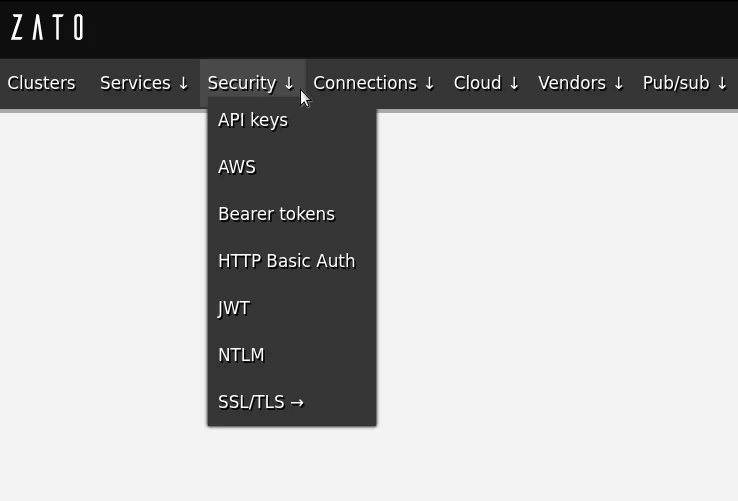Zato is a Python-based integration platform that lets you build and deliver enterprise solutions with ease, from online APIs, business processes, data science, AI, ML, IoT, mainframe and cloud migrations to automation, digital transformation, knowledge graphs and state-of-the-art technologies, combining ease of use with safety and security.
This is free and open source software.
Features include:
- Convenient API integrations and automation in Python.
- Python Cloud API IDE built-in. Develop, deploy and invoke your API integrations and automations using Python, straight from your browser. Or use an IDE that you already have, such as VS Code or PyCharm.
- Create REST API services and manage them centrally using the Zato Dashboard, making the entire integration process intuitive and effort-free.
- Automate Python API services and batch jobs, and express any schedules succinctly using a GUI for background tasks.
- Convenient cloud connections.
- Automatically add API security to your Python services straight from your Dashboard. And by the way, you will not have to implement OAuth2 manually anymore either.
- SFTP, batch file transfer and shell commands.
- Orchestrate e-mail automations and seamlessly integrate with SMTP and IMAP servers, including Azure and Microsoft 365.
- Optimize your integrations and make them more convenient with a built-in caching layer that does not require any external dependencies.
- Publish/subscribe and message queues.
- SQL, including MS SQL and Oracle DB.
- LDAP, MongoDB, Redis, IBM MQ, AMQP and other data sources.
- HL7 FHIR and MLLP.
- Real-time IoT communication with devices and mobile apps using a protocol designed for low latency and messaging overhead.
- Dozens of connection types and adapters – and you can always import your own extra Python libraries when needed too.
Website: github.com/zatosource/zato
Support:
Developer: Zato Source s.r.o.
License: GNU Affero General Public License v3.0

Zato is written in Python. Learn Python with our recommended free books and free tutorials.
| Popular series | |
|---|---|
| The largest compilation of the best free and open source software in the universe. Each article is supplied with a legendary ratings chart helping you to make informed decisions. | |
| Hundreds of in-depth reviews offering our unbiased and expert opinion on software. We offer helpful and impartial information. | |
| The Big List of Active Linux Distros is a large compilation of actively developed Linux distributions. | |
| Replace proprietary software with open source alternatives: Google, Microsoft, Apple, Adobe, IBM, Autodesk, Oracle, Atlassian, Corel, Cisco, Intuit, SAS, Progress, Salesforce, and Citrix | |
| Awesome Free Linux Games Tools showcases a series of tools that making gaming on Linux a more pleasurable experience. This is a new series. | |
| Machine Learning explores practical applications of machine learning and deep learning from a Linux perspective. We've written reviews of more than 40 self-hosted apps. All are free and open source. | |
| New to Linux? Read our Linux for Starters series. We start right at the basics and teach you everything you need to know to get started with Linux. | |
| Alternatives to popular CLI tools showcases essential tools that are modern replacements for core Linux utilities. | |
| Essential Linux system tools focuses on small, indispensable utilities, useful for system administrators as well as regular users. | |
| Linux utilities to maximise your productivity. Small, indispensable tools, useful for anyone running a Linux machine. | |
| Surveys popular streaming services from a Linux perspective: Amazon Music Unlimited, Myuzi, Spotify, Deezer, Tidal. | |
| Saving Money with Linux looks at how you can reduce your energy bills running Linux. | |
| Home computers became commonplace in the 1980s. Emulate home computers including the Commodore 64, Amiga, Atari ST, ZX81, Amstrad CPC, and ZX Spectrum. | |
| Now and Then examines how promising open source software fared over the years. It can be a bumpy ride. | |
| Linux at Home looks at a range of home activities where Linux can play its part, making the most of our time at home, keeping active and engaged. | |
| Linux Candy reveals the lighter side of Linux. Have some fun and escape from the daily drudgery. | |
| Getting Started with Docker helps you master Docker, a set of platform as a service products that delivers software in packages called containers. | |
| Best Free Android Apps. We showcase free Android apps that are definitely worth downloading. There's a strict eligibility criteria for inclusion in this series. | |
| These best free books accelerate your learning of every programming language. Learn a new language today! | |
| These free tutorials offer the perfect tonic to our free programming books series. | |
| Linux Around The World showcases usergroups that are relevant to Linux enthusiasts. Great ways to meet up with fellow enthusiasts. | |
| Stars and Stripes is an occasional series looking at the impact of Linux in the USA. | |

